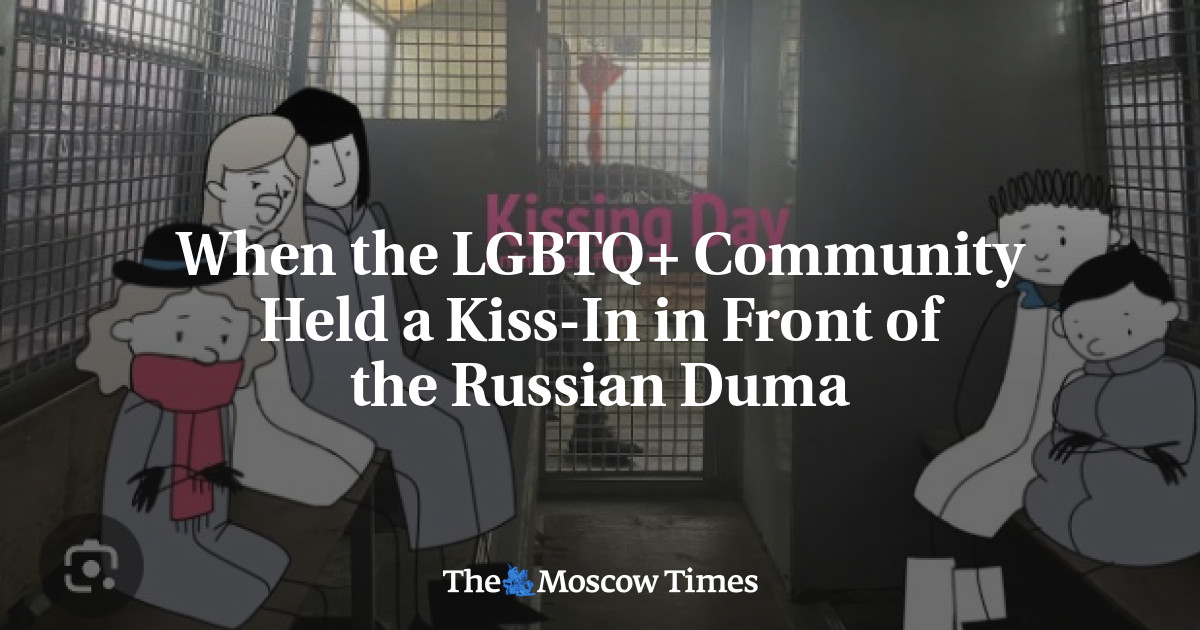
“Kissing Day” is a short animated film based on an interview with the famous Russian journalist, writer and LGBTQ+ activist Elena Kostyuchenko. It tells the story of the “Kissing Day” event that Elena organized in front of the Russian State Duma in 2012 during the first hearings of the law against “gay propaganda” among minors. Russian LGBTQ+ activists organized a total of four protests outside the State Duma.
The director of the film agreed to give an interview to The Moscow Times, but requested anonymity to protect their safety.
Why did you decide to concentrate on the story of Elena Kostyuchenko and the protests of 2012?
I was granted a lengthy interview with Elena, and as the scriptwriter and I contemplated which part to choose for the movie, the one involving “Kissing Day” felt very powerful to me. The story was painful; there was a lot of absurdity and horror, but Elena told about it with humor.
How long did you work?
In 2019, I started to work on the film with the hope of finishing it soon, but that didn’t happen. In 2020, Covid-19 began to spread around the world. I missed my deadline, and I didn’t have another one.
The film lay half-done for a very long time, and I didn’t have enough energy to finish it. I was having a real creative crisis… but I asked for help, and I received a lot of support from people.
In January 2023, I was very tired after a very stressful project. My partner and I were discussing what comes next, and he offered me his support, suggesting that I could simply rest, take my time, and contemplate what truly matters to me. He was aware of my struggle with this documentary and how upset I was about not being able to finish it. He inspired me to take this final step, providing strength, resources, and motivation.
In November 2023, the Russian Supreme Court recognized the LGBTQ+ movement as extremist. Did you consider stopping the project to protect yourself?
Never. Some days I wished that the film would have a quiet run, without drawing attention – primarily out of fear. The closer the movie came to its conclusion, the more homophobic laws were either passed or discussed. However, the decision to release it anonymously only came after the concept of an “extremist organization” was approved.
In August 2023, Elena Kostyuchenko reported that there was probably an attempt to poison her in Germany in October 2022. At that point I realized that my film might be dangerous because it would attract attention to her. But despite my fears, I didn’t consider stopping.
Of course, it’s scary, but I can’t remain silent. I have been a socially active person since childhood, and I can’t keep silent today.
“Kissing Day” premiered on Valentine’s Day, Feb. 14 of this year. The film team joined the #ГолосПоддержкиЛГБТК campaign (Voice of support for LGBTQ people), an action of solidarity with queer people in Russia launched by Plus Voice, an international movement of parents of LGBTQ+ people. Are you going to promote the film?
We have two versions of the film, one of them is Russian, and the other has English subtitles. Many Russian LGBTQ sources and independent media wrote about the film. We are currently submitting the film to international festivals, hoping that people outside of the Russian-speaking community will have the opportunity to see it as well.
What is the purpose of “Kissing Day”?
When I started I just wanted to tell a story, make a documentary animated film about LGBTQ protests in Russia. At the time my purpose was to support the LGBTQ community. That is still the purpose of the Russian version: to send them love, strength, and to let them know that there are people who don’t think the way the government wants the majority to think. And that we have a voice and courage. With the English version, I would like to tell the world about what has been happening in Russia in general, about how it all began, and to attract attention to the problem.
In the past I thought that I could change people’s minds, but then I realized that this is utopia. I don’t think that Vladimir Putin will watch the film and decide to change his policies. Unfortunately, this film will not convince any homophobes.
But I do hope it will help people who have never thought about this topic, and that they will begin to lean toward being more tolerant and empathetic. I want this issue to be raised.
I’m very glad that we finished the film this year because it seemed like everything bad that could happen for the Russian LGBTQ community had happened. It’s very important now, in an atmosphere of complete horror, to continue to talk about it and attract as much attention as possible.
When I read comments on YouTube, I would like to say to everyone: “We are grieving, but we aren’t alone in our grief. We are together.”





